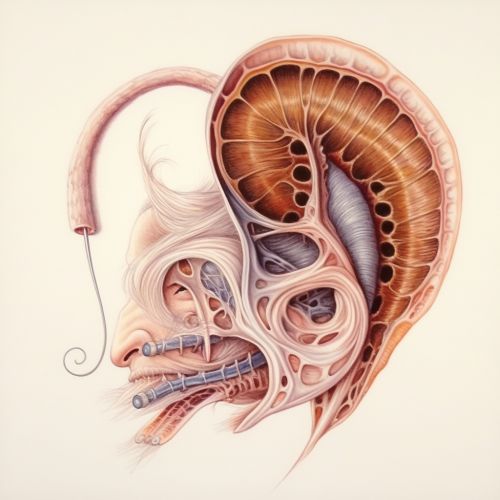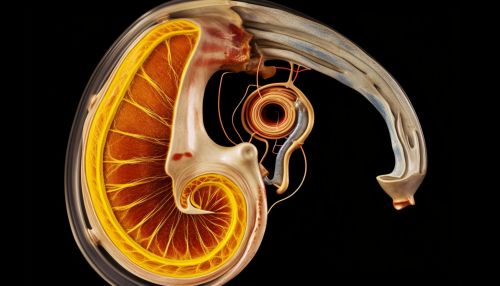Meniere's disease
Introduction
Meniere's disease is a chronic, incurable vestibular (inner ear) disorder that produces a recurring set of symptoms as a result of abnormally large amounts of a fluid called endolymph collecting in the inner ear. This fluid buildup leads to changes in the ear that can cause severe and debilitating episodes of vertigo, tinnitus, hearing loss, and aural fullness. The disease was first identified by French physician Prosper Meniere in 1861, who suggested that the symptoms were from the inner ear and not the brain, as was commonly believed at the time.
Etiology
The exact cause of Meniere's disease is unknown, but it is believed to be related to the improper drainage of endolymph fluid in the inner ear. This can be due to anatomical abnormalities, blockages, immune response, or viral causes. Some researchers believe that Meniere's disease is a consequence of damage to the hair cells in the cochlea, the sensory organ for hearing. Other theories suggest it may be related to blood vessel constriction, autoimmune reactions, allergies, or genetic predisposition.


Symptoms
The primary symptoms of Meniere's disease are recurrent episodes of vertigo, tinnitus, hearing loss, and aural fullness.
Vertigo
Vertigo is a sensation of feeling off balance, often described as a spinning sensation, which may cause nausea and vomiting. In Meniere's disease, episodes of vertigo can last from a few minutes to 24 hours.
Tinnitus
Tinnitus is the perception of noise or ringing in the ears. It is a common symptom of Meniere's disease and can be constant or intermittent, and vary in volume.
Hearing Loss
Hearing loss in Meniere's disease is initially intermittent, typically occurring in the lower frequencies, but over time it becomes permanent and involves all frequencies. With continued progression of the disease, hearing loss extends to the higher frequencies and eventually becomes profound.
Aural Fullness
Aural fullness, or a feeling of fullness in the ear, is another common symptom of Meniere's disease. This can be described as a pressure or discomfort in the ear, often in conjunction with changes in hearing.
Diagnosis
Diagnosis of Meniere's disease can be challenging as there is no definitive test. It is often diagnosed based on clinical history and physical examination, including hearing tests. The American Academy of Otolaryngology-Head and Neck Surgery (AAO-HNS) has established criteria for diagnosing Meniere's disease which includes: two or more episodes of vertigo lasting at least 20 minutes, tinnitus or aural fullness in the affected ear, and hearing loss confirmed by a hearing test.
Treatment
While there is no cure for Meniere's disease, treatments are available that can help manage the symptoms. These include medications, lifestyle changes, physical therapy, devices, and surgery.
Medications
Medications for Meniere's disease are aimed at managing the symptoms. These include diuretics to reduce fluid retention, anti-vertigo drugs to manage vertigo episodes, and anti-nausea medications.
Lifestyle Changes
Lifestyle changes such as dietary modifications can help manage Meniere's disease. This includes a low-sodium diet to reduce fluid retention, avoiding caffeine and alcohol, and quitting smoking.
Physical Therapy
Vestibular rehabilitation therapy (VRT) is a form of physical therapy that uses exercises designed to promote central nervous system compensation for inner ear deficits. VRT can help improve balance and reduce the frequency and severity of vertigo episodes.
Devices
Hearing aids can be used to manage hearing loss in Meniere's disease. In some cases, a device called a Meniett device, which applies pulses of pressure to the ear canal, may be used.
Surgery
In severe cases where other treatments have failed, surgery may be considered. Surgical options include procedures to reduce fluid production or improve fluid drainage in the inner ear, or more invasive procedures that aim to control vertigo by reducing the function of the balance organs in the inner ear.
Prognosis
The course of Meniere's disease can vary from person to person. Some people may experience only minor and infrequent episodes, while others may have severe and frequent episodes. Over time, most people will experience some degree of permanent hearing loss.
Epidemiology
Meniere's disease can occur at any age, but it most commonly starts between the ages of 20 and 50. It is estimated to affect between 0.2 and 0.6% of the population. The disease can occur in both men and women, and can affect one or both ears.
